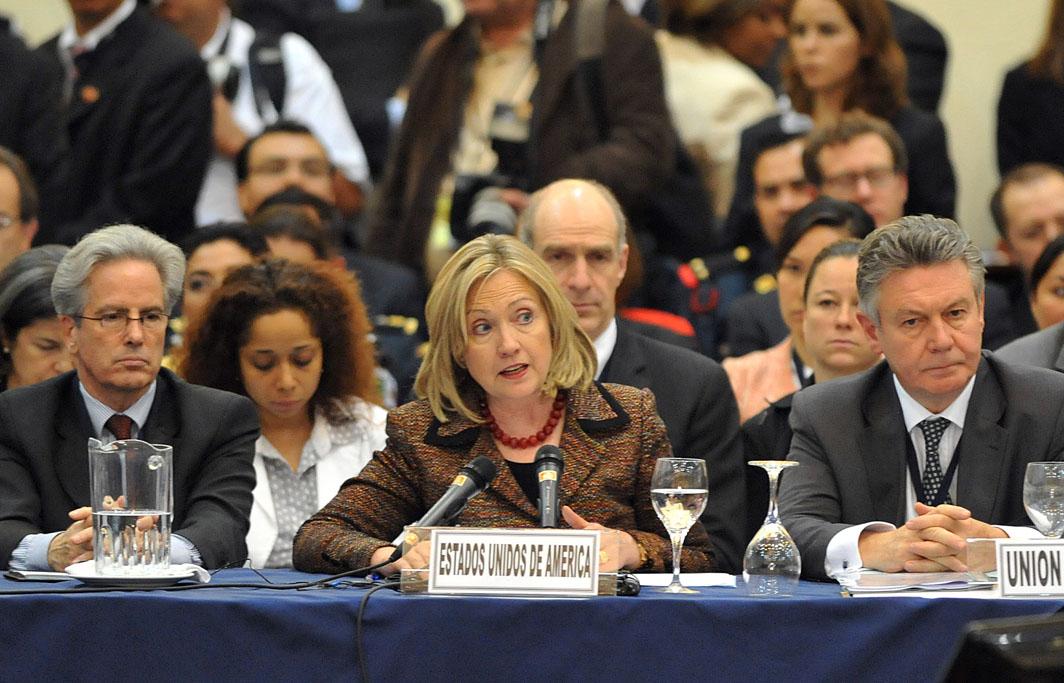GHI in Guatemala
US Secretary of State Hillary Clinton delivers a speech during the International Conference of Support for the Central American Security Strategy on June 22, 2011 in Guatemala City.
GUATEMALA CITY – I'm currently traveling in Guatemala for GlobalPost as part of our series on the Obama Administration's Global Health Initiative. We'll be looking at how the initiative seeks to do a better job at improving the health of 50 percent of Guatemala's children under five who are malnourished.
But first some context.
Presidential elections are in full swing in this Central American country. Voters will go to the polls in September to choose their fifth president since the 1996 peace accords ended more than three decades of brutal civil war.
In a country where half of the population lives in poverty, there is no lack of issues. But by far the most important for voters, and thus politicians, is the country’s debilitating insecurity. In 2009, more Guatemalans were reported killed than civilians slain in the war zone of Iraq. Nearly half of the country’s average 18 homicides a day are related to drug trafficking.
Last week, all seven Central American presidents, U.S. Secretary of State Hillary Clinton, and other foreign representatives gathered in a Guatemala City hotel to discuss strategies to fight the alarming drug-related violence.
During her speech, Clinton acknowledged the responsibility the U.S. must bear as the largest drug-consuming country. But she also focused on the responsibilities the countries themselves must shoulder, pointing out that the majority have very low tax rates. Guatemala has one of the lowest tax collection rates in the world, accounting for barely more than 10 percent of its gross domestic product.
“Businesses and the rich must pay their fair share of taxes,” Clinton said. “True security cannot be funded on the backs of the poor.”
The U.S. pledged $300 million to the region, a third more than President Barack Obama promised in a related conference in El Salvador earlier this year. Yet the aid pales in comparison to the up to $1.1 billion a year the U.S. spent to fight the Colombia’s drug war during “Plan Colombia” ten years ago. Thanks to the global economic crisis, and the U.S.’ own budget woes, there is simply less money to go around.
That goes for the U.S. strategy for improving global health, too. Obama’s Global Health Initiative, an ambitious expansion and revision of how the U.S. is funding and rethinking global aid, initially envisioned a $63 billion project to be implemented over six years.
That looks increasingly unlikely. Congress has approved roughly 40 percent of Obama’s target for global health during the first three years of funding. The plan was to rapidly increase funding in the last three years of the project, but now global health experts say that given the current budget climate GHI is on track to fall billions short of its original target.
In Guatemala, GHI spending in FY 2009 was $14 million and in FY 2010, $14.6 million. Spending in FY 2011 is about equal to that in 2010, and cuts are a possibility in FY 2012. With little new money, officials are focusing on better coordination between agencies.
We want to hear your feedback so we can keep improving our website, theworld.org. Please fill out this quick survey and let us know your thoughts (your answers will be anonymous). Thanks for your time!
